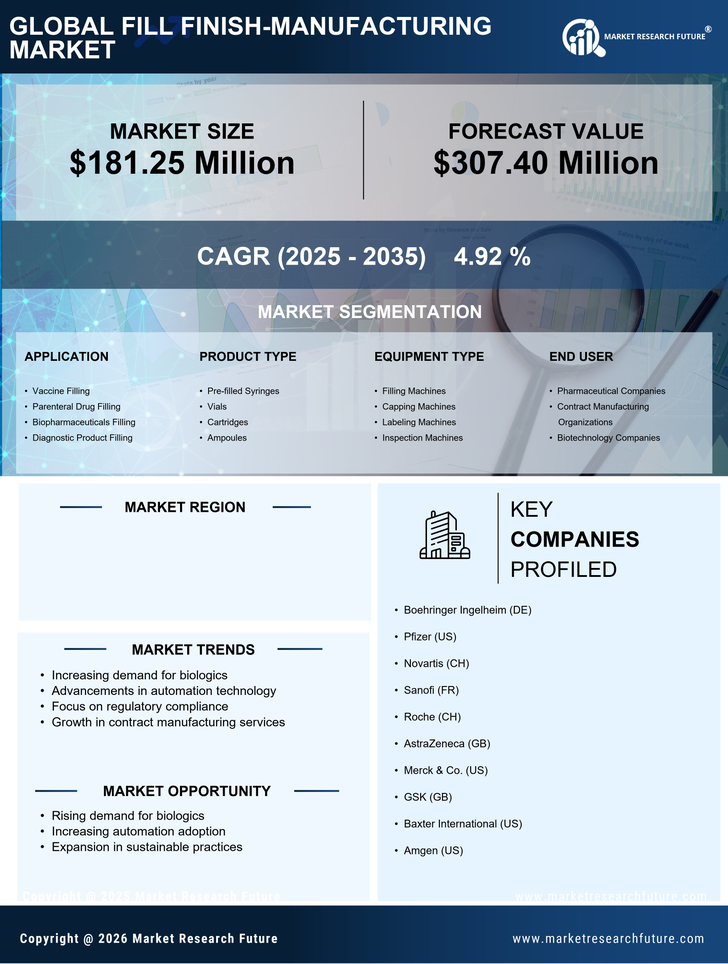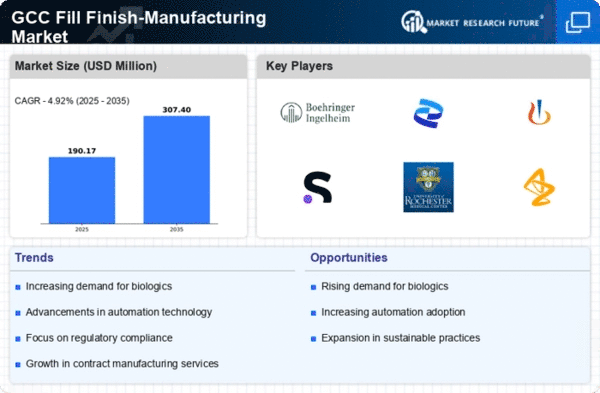Growing Focus on Quality Assurance
Quality assurance remains a critical driver for the fill finish-manufacturing market, particularly in the GCC region. As regulatory bodies impose stricter guidelines on pharmaceutical products, manufacturers are compelled to enhance their quality control measures. The emphasis on compliance with Good Manufacturing Practices (GMP) is paramount, as it ensures that products are consistently produced and controlled according to quality standards. The GCC's regulatory framework is evolving, with increased scrutiny on manufacturing processes, which could lead to a rise in operational costs. However, investing in robust quality assurance systems is likely to yield long-term benefits, including reduced product recalls and enhanced consumer trust. Consequently, the focus on quality assurance is expected to drive innovation and investment in the fill finish-manufacturing market, as companies strive to meet and exceed regulatory expectations.
Rising Demand for Biopharmaceuticals
The increasing demand for biopharmaceuticals in the GCC region is a primary driver for the fill finish-manufacturing market. As healthcare systems evolve, there is a notable shift towards biologics, which require specialized fill finish processes. The GCC biopharmaceutical market is projected to grow at a CAGR of approximately 8% from 2025 to 2030, indicating a robust need for advanced manufacturing capabilities. This growth is likely to spur investments in fill finish technologies, ensuring that manufacturers can meet the stringent requirements of biologics. Furthermore, the rise in chronic diseases necessitates the development of innovative therapies, further propelling the fill finish-manufacturing market. The ability to efficiently produce and package these complex products is crucial for maintaining quality and efficacy, thereby enhancing the overall healthcare landscape in the region.
Investment in Advanced Manufacturing Technologies
Investment in advanced manufacturing technologies is significantly influencing the fill finish-manufacturing market. The GCC countries are increasingly focusing on modernizing their pharmaceutical manufacturing capabilities to enhance efficiency and reduce costs. Technologies such as automation, robotics, and artificial intelligence are being integrated into fill finish processes, leading to improved precision and reduced human error. Reports indicate that the adoption of these technologies could lead to a reduction in production costs by up to 20%, making it a compelling driver for manufacturers. Additionally, the push for Industry 4.0 is encouraging companies to adopt smart manufacturing practices, which are expected to streamline operations and enhance product quality. This trend not only supports the growth of the fill finish-manufacturing market but also positions the GCC as a competitive player in the global pharmaceutical landscape.
Expansion of Contract Manufacturing Organizations (CMOs)
The expansion of Contract Manufacturing Organizations (CMOs) in the GCC is a notable driver for the fill finish-manufacturing market. As pharmaceutical companies seek to optimize their operations and reduce overhead costs, many are turning to CMOs for specialized services. This trend is particularly pronounced in the fill finish segment, where CMOs offer expertise in handling complex biologics and sterile products. The GCC is witnessing a surge in the establishment of CMOs, which are equipped with state-of-the-art facilities and technologies. This growth is expected to enhance the overall capacity of the fill finish-manufacturing market, allowing for greater flexibility and scalability in production. Furthermore, partnerships between pharmaceutical companies and CMOs are likely to foster innovation and accelerate time-to-market for new products, thereby strengthening the competitive landscape in the region.
Increasing Regulatory Scrutiny and Compliance Requirements
Increasing regulatory scrutiny and compliance requirements are shaping the landscape of the fill finish-manufacturing market. Regulatory agencies in the GCC are intensifying their focus on ensuring that pharmaceutical products meet stringent safety and efficacy standards. This trend necessitates that manufacturers invest in comprehensive compliance strategies, which may include upgrading facilities and implementing advanced quality management systems. The cost of non-compliance can be substantial, potentially leading to fines and product recalls, which underscores the importance of adhering to regulations. As a result, companies in the fill finish-manufacturing market are likely to allocate more resources towards compliance initiatives, which could drive innovation in manufacturing processes. This heightened focus on regulatory compliance not only enhances product quality but also builds consumer confidence in the pharmaceutical sector.

















